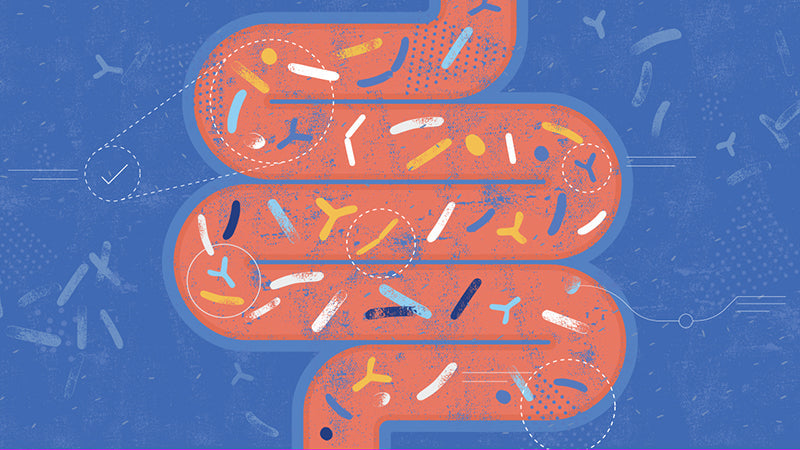A healthy microbiome leads to better digestion, less gas, and a more comfortable, bloat-free lifestyle.

Your Gut Microbiome Holds the Key to a Bloat-Free Life
|
|
Time to read 4 min
|
|
Time to read 4 min
If you've felt your stomach inflate like a balloon, even after a healthy meal - don’t worry you’re not alone.
BLOATING is one of the most common gut complaints which often strikes without any warning. It might make you feel heavy, tight, uncomfortable, gassy (most of the time makes you feel like your stomach is filled with air) or even self-conscious.
Surprisingly, it's not always about what you eat, but often about how your gut microbiome responds to it.
In this blog, we’ll break down why bloating happens (especially with healthy foods), how your gut bacteria are involved, and how we can relieve this bloating.
Important to remember that: ‘Bloating is a Symptom not a Condition’
Your gut is home to a bustling ecosystem of microorganisms (bacteria, viruses and fungi) collectively known as the gut microbiome. These minute organisms play essential roles in digestion, metabolism etc. but when the balance is off even healthy foods can trigger bloating.
Dysbiosis is an interesting state, which occurs due to this microbial imbalance can lead to our gut overproducing gas, over-sensitiveness and even struggle in breaking down even healthy food. That’s when bloating, discomfort and irregular digestion creep in.
No two people share the same microbiome. It’s as unique as your fingerprint. The microbes in your gut:
Everyone’s gut reacts differently; what causes one to bloat might be completely tolerable to another. That’s why personalized care is essential. Claisen is a gut health startup whose approach is based on taking your unique microbiome and symptom profile into account to build a plan that works for your gut.
Try out our quick 2-minute quiz right now to receive a personalized solution:
Bloating isn’t just caused by junk food or over-eating, some super foods can trigger bloating too. It often starts with improper digestion and gas accumulation in the gut.
Your gut bacteria naturally ferment undigested food, especially certain fibers and sugars. While this process is essential for gut health, it also produces gases like hydrogen, CO2 and methane.
Fun Note: Even the healthiest salad can lead to bloating if eating too quickly under stress
FODMAPs is an abbreviation for Fermentable Oligosaccharides, Disaccharides, Monosaccharides and Polyols (key group of foods responsible for bloating).
These are short-chain carbohydrates that are poorly absorbed in the small intestine and are easily fermented by gut microbes, leading to excess gas production especially in sensitive individuals (eg. those with IBS).
Or in short - ‘Fermentable Carbs that Feed Gas Production’
| FODMAP Type | Common Sources |
|---|---|
| Fructans | Wheat, onion, garlic |
| Fructose | Mango, apple, honey |
| Lactose | Milk, yoghurt, cheese |
| Galacto-oligosaccharides | Lentils, kidney beans |
| Polyols | Cauliflower, sugar-free gum |
While foods like fried items, alcohol and processed snacks are well-known triggers, several nutritious foods can also cause bloating in some people.
Tip: Lightly steaming or sautéing raw greens can reduce their bloating potential by Softening Fiber.
At Claisen, We Believe: A Healthy Microbiome = A Bloat-Free Life
We deliver results that help heal your gut microbiome which is the foundation of your digestive health.
Unlike the ‘One-Size-Fits-All' approach, Claisen recognizes that your gut is unique.
Using our kits (mentioned here) tailored to your use they are designed to alleviate bloating, gas and other gastrointestinal issues and support digestion.
Each month you will receive:
Claisen’s quiz recognizes and understands each individual's food sensitivities, our body’s response to fiber, FODMAPS, and hence provides targeted probiotics, digestive enzymes etc.
Bloating isn’t always about what you eat; it often stems from how your gut microbiome reacts to foods and produces excess gas.
A balanced gut microbiome supports digestion and prevents bloating, while imbalance (dysbiosis) can cause discomfort.
FODMAPs are fermentable carbs that can trigger bloating when poorly absorbed and over-fermented in the gut.
Even healthy foods like broccoli, kale, and lentils can cause bloating depending on your gut’s sensitivity.
Personalized gut care, such as Claisen’s quiz and kits, helps identify triggers and tailor solutions for lasting relief.
A healthy microbiome leads to better digestion, less gas, and a more comfortable, bloat-free lifestyle.
This article and its contents have been medically reviewed by Aditya Jain (MD at Harvard Medical School and Op-Ed Fellow at Doximity).



